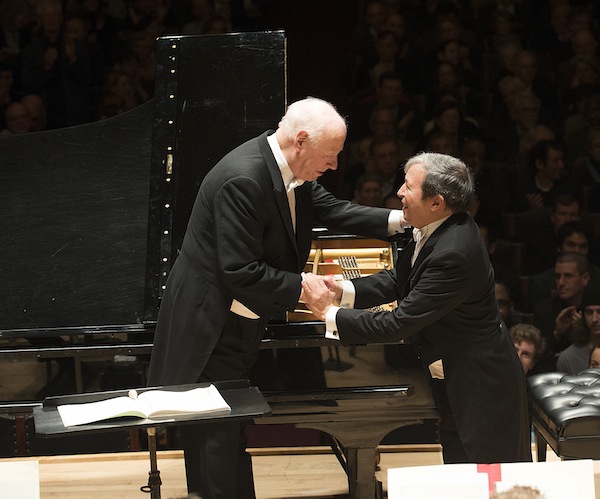Concert Review: Boston Symphony Orchestra plays Stucky, Schumann, and Brahms
Pianist Murray Perahia’s return this weekend, with Schumann’s A minor Concerto, seemed tailor-made on paper: he’s one of the world’s great chamber musicians and this concerto, which is as introverted and chamber-like as it is extroverted and showy, plays to all his strengths.

Conductor Bernard Haitink and Pianist Murray Perahia bow following the BSO’s performance of Schumann’s Piano Concerto. Photo: Stu Rosner.
By Jonathan Blumhofer
Love and death, those evergreen staples of literature, stage, screen, and song, made their return to Symphony Hall this weekend, almost in time for Valentine’s Day (don’t worry: on the actual day, they’ll be back in the Hall, courtesy of West Side Story). The Boston Symphony Orchestra’s (BSO) most recent subscription series paired two elegiac works – Steven Stucky’s Funeral Music for Queen Mary and Brahms’s valedictory Symphony no. 4 – with Robert Schumann’s ode to his beloved Clara: the Piano Concerto in A minor.
Stucky’s Funeral Music actually mostly belongs to the great English composer Henry Purcell. Originally composed for the funeral of Queen Mary II in 1694, Stucky reorchestrated Purcell’s three-movement suite and fused the separate sections into a stately, eight-minute-long whole. The shadow of Stravinsky’s adaptation of Pergolesi is never far off, though Stucky’s score is much smaller in both scale and ambition.
It’s a wonderful, if short, piece. Much of the musical interest lies in the dovetailing between voices – plangent winds and muted trumpets, for instance – and in Stucky’s layering of textures (there’s a marvelously rich, dissonant passage about three-quarters of the way through that emerges like a mist and builds to its climax before vanishing as suddenly as it came).
Bernard Haitink, back for his second week of concerts with the orchestra, isn’t known for conducting contemporary music, but he seems to have an affinity for this piece. He drew a suitably magisterial performance on Saturday from the BSO’s brass, winds, and percussion.
Haitink was fully in his element, too, in Brahms’s Fourth Symphony. This is music that is infused with Brahms’s well-justified pessimism about the future of Europe, circa 1885, its outer movements unrelenting in their apocalyptic Weltanschauung, while the middle ones are notable for their cool restraint.
Saturday’s taut, brisk performance featured plenty dispassionate composure in the opening of the second movement that blossomed into soaring – but not quite convincing – warmth by the end.
The third movement, which came off perhaps a bit more heavy-footed than it should have, lacked some of its requisite humor. But its trio section sparkled and, even if the whole movement passed like a roller coaster running down a hill, there was a certain thrill to be had just from the sheer energy it gave off.
In the outer movements, grim, sovereign nihilism prevailed. The first movement unfolded with textural clarity and rhythmic energy. There were moments of great, lingering beauty to be had (such as the start of the recapitulation), but overall this was a reading that emphasized a sense of resignation and foreboding.
The symphony reached its resolution in the finale, which, with its relentlessly descending bass line, drove headlong into a terrible abyss. It wouldn’t have hurt to linger a bit over some of its thirty-odd variations – the slow, middle section, especially, felt a bit hurried – but, as an interpretive choice, Haitink’s quick tempos lent a sense of inevitability to the work’s wrenching climax. One came away realizing that, bitter as Brahms’s outlook was in the 1880s, not much has changed in the ensuing 130 years to make it – or this symphony – any less relevant.
Remarkably, pianist Murray Perahia hasn’t appeared on a BSO subscription series since 2000, when he played Beethoven’s First Concerto. His return this weekend, with Schumann’s A minor Concerto, seemed tailor-made on paper: he’s one of the world’s great chamber musicians and this concerto, which is as introverted and chamber-like as it is extroverted and showy, plays to all his strengths.
Saturday’s performance featured plenty of strong solo moments. The closing sections of the outer movements – notably the first movement’s cadenza and the exuberant last part of the finale – brought out brilliant colors and a strong sense of the music’s poetic character.
But the whole performance never quite gelled. Perahia and the orchestra seemed to be feeling each other out for much of the first two movements (the second, a gentle dialogue between soloist and orchestra, didn’t really hit its stride until it was almost over) and the finale’s shifting moods came across abruptly, rather than smoothly.
Haitink balanced the orchestra well with the soloist, though this might have also been part of the problem: the orchestral sound felt restrained and tentative throughout. To judge from the ovation that followed, mine is a minority view, but this was a disappointing performance that should have added up to more.
This week, the BSO heads to New York City for two concerts at Carnegie Hall. On the bill are this weekend’s program and last week’s all-Ravel extravaganza. It’s appropriate that Haitink, who’s been one of the orchestra’s most reliable friends over these last, difficult years will be on the podium for them. Next time the BSO heads to Carnegie, Andris Nelsons will be at the helm; a new era fast approaches.
Jonathan Blumhofer is a composer and violist who has been active in the greater Boston area since 2004. His music has received numerous awards and been performed by various ensembles, including the American Composers Orchestra, Kiev Philharmonic, Camerata Chicago, Xanthos Ensemble, and Juventas New Music Group. Since receiving his doctorate from Boston University in 2010, Jon has taught at Clark University, Worcester Polytechnic Institute, and online for the University of Phoenix, in addition to writing music criticism for the Worcester Telegram & Gazette.
Tagged: Bernard Haitink, Boston Symphony Orchestra
